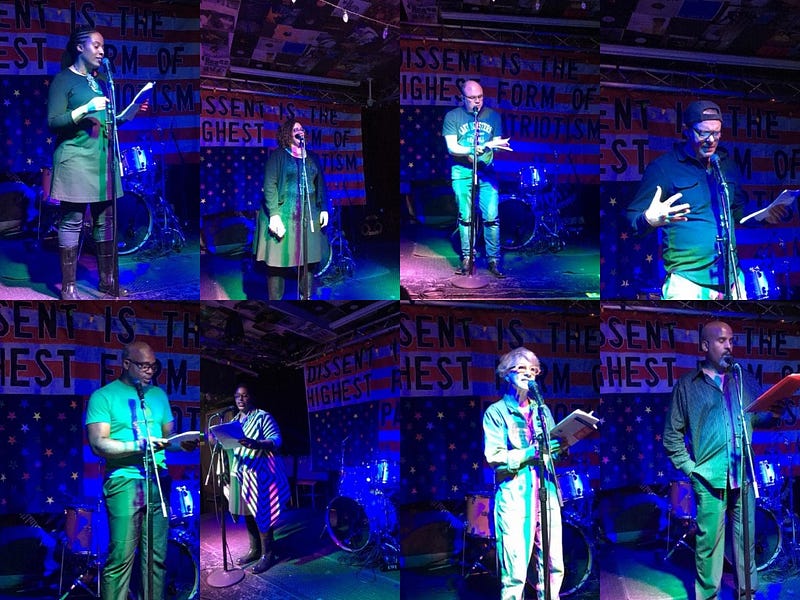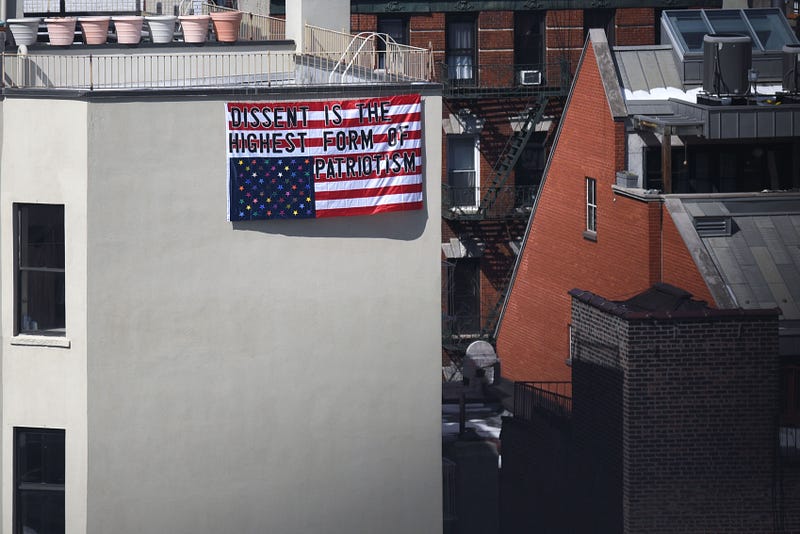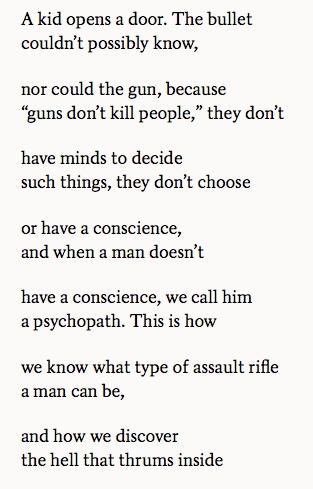
Just over a year ago, Melody Nixon and I planned a special politics-focused night at the First Person Plural Reading Series in Harlem. We called it “What Just Happened? Writers Respond to the 2016 US Presidential Election.” I was excited. Politics is my thing. And the stakes were so high. I imagined participants would show disgust over what had been a truly degraded campaign year. I assumed some would pay homage to Hillary Clinton’s historic win. While many, I knew, would speak to how we must push the President-elect so that we could feel felt progress on equal rights, equal opportunity, and equal protection under the law.
I thought I could see it all.
Then Election Night came and went and it felt like death. We faced a future where progress could be pulled up like cheap carpet, revealing the hard American truths beneath. If you’re a person of color in this country, you know that none of this mess started with Trump. But his election has been kerosene thrown on all of the other crises we’d been coping with. The fires burn, yet we live with the knowledge that no matter how bad things are, they can still get worse.
This past Election Night, I was honored to present this diverse lineup: artist/attorney Suzanne Russell, essayist Max S. Gordon, anthropologist Yarimar Bonilla, attorney/organizer Keesha Gaskins-Nathan, actor PJ Marshall, poet Matthew Olzmann, sociologist Carla Shedd, and activist Ibrahim Abdul-Matin. Each participant has been a voice to heed in their respective fields. How would they remember the year? What beauty, pain, guidance would they share with us?
I couldn’t wait to find out. Neither could the packed tables at Shrine Harlem.
Attorney/artist Suzanne Russell kicked off the night with Howard Zinn readings that have inspired her over the past year and supplied the text for the artwork she created and hung from a building downtown, and tonight above our Shrine stage. An excerpt:
While some people think that dissent is unpatriotic, I would argue that dissent is the highest form of patriotism. In fact, if patriotism means being true to the principles for which your country is supposed to stand, then certainly the right to dissent is one of those principles. And if we’re exercising that right to dissent, it’s a patriotic act.

In moving remarks that reaffirmed how much “life wants life” but that it’s up to us to save ourselves, essayist Max S. Gordon shared with us intimate moments that illuminated our present situation, including scenes from a childhood filled with domestic violence, and how they helped him understand the abuse we experienced during Trump’s presidency.
Then Gordon had us cheering when he conjured the spirit of Fannie Lou Hamer in this passage:
I like horror movies, not the slasher genre, but psychological horror, and especially 70’s horror — Rosemary’s Baby, Omen, Carrie, The Exorcist. There is that amazing scene in The Exorcist where the priest says to the devil who has possessed the young girl, Reagan, ‘The power of Christ compels you. The power of Christ compels you!’
The other day Donald Trump came up on the screen — and now, I don’t know much about exorcisms, but the shit seemed to work on that devil — and so I thought, why not? So I just blurted out, ‘The power of Fanny Lou Hamer compels you!’
Now for those who may not know or remember, Fanny Lou Hamer was a black organizer in the Deep South, a civil-rights activist, who fought to exercise her right to vote in a virulently racist Mississippi. She was tortured, her life was threatened, and she even had to battle for the right to be heard within her own political party. Fanny Lou said, ‘I’m sick and tired of being sick and tired’ and ‘Nobody’s free, until everybody’s free.’ She had what the old folks call Holy Ghost power.
And if any human power could neutralize Trump’s malice, it would certainly be Fanny Lou Hamer’s.
Rutgers anthropologist Yarimar Bonilla spoke to the weirdness of being a Puerto Rican on Election Night, given that those in PR cannot vote for representation as those of us on the mainland can. She made the poignant observation that educated mainlanders can know all about Native genocide, slavery, and Jim Crow, but know little, or nothing, about American colonialism. She spoke to feeling conflicted reading well-meaning people declare “how could [what’s happening to Puerto Ricans] happen to American citizens?!”, because as Bonilla would later say: “citizenship doesn’t save you.” We only have to look as far as Flint, Michigan to know this is true.
Next spoke attorney Keesha Gaskins-Nathan, director of the Democratic Practice — United States program at the Rockefeller Brothers Fund, formerly of the Brennan Center for Justice. She compared the election of “45” to the election of 1876 and the Compromise of 1877:
Rutherford B. Hayes lost the popular vote, won the electoral college and was installed by vote of Congress. The compromise to hand the election to Hayes was for Hayes to pull federal troops out of the South, effectively ending Reconstruction — and ushering in the Jim Crow era. That would not end until the Civil Rights movement in the beginning of the early 1950s and ending in 1965 with the passage of the Civil Rights Act, the Voting Rights Act and the Immigrant Act.
While clear-eyed, Gaskins-Nathan remained hopeful, noting how many resistance groups have emerged since the election. Though she asked: “Where can resistance take us if our voices of resistance are not connected in relationship, strategy, or vision?” She concluded this way:
As we find our collective voice, we need not have a singular strategy but we must have a movement that recognizes a multicultural future where our destinies are not segregable but a shared voice for a just and prosperous future. And for that we must fight. We must fight for the freedom we seek.
Poet Matthew Olzmann joined us from Detroit via Dartmouth, and his short reading of his poems stopped breath and hearts. Below is an excerpt of his poem “Letter Beginning with Two Lines by Czesław Miłosz”:

Actor PJ Marshall, who played overseer Bill Meekes in WGN’s Underground, spoke poignantly about having his consciousness raised during the two years he live-tweeted during Underground broadcasts and interacted with “Black Twitter”, acknowledging how much he never had to know about American history and American right now because of his racial status. He spoke about the peculiar experience of having Russian trolls target his tweets with racist responses, in seeming attempts to stoke discord. He shared that he now engages people, especially pro-Trump people, on race, risking uncomfortable, but necessary conversations with those who’ve historically benefited from silence.
Urban sociologist Carla Shedd, author of Unequal City: Race, Schools, and Perceptions of Injustice, asked us to think about the place of justice in our democracy. After noting how demoralizing it can be to vote in general elections where down-ballot choices are not choices at all, she shared a bit of her current research on the carceral continuum, focusing on juvenile justice here in New York City. Shedd’s research investigates what’s working, and what’s harming our youth as they move through juvenile systems that seem to punish more than they protect.
And we finished with return participant, environmental activist and writer Ibrahim Abdul-Matin. Last year, he helped us remember a time before concrete and capitalism. This time, we shared a glorious ode to cities, from antiquity to today. He concluded with the assertation that when you have New York City, you don’t need the federal government — and can kiss Trump, and others who look down on cities as burning hellholes goodbye…
We finished the night with Keesha Gaskins-Nathan reading a few Election Night results that left us happy, hopeful. I left Shrine feeling fatigue and grief for what people have suffered over the last year, but I also felt determined. It’s up to us to band togther and help each other. And listening to these readers, I knew we’d have the vision, that there are possibilities ahead for us that are brighter than anything the 45th President could imagine.
